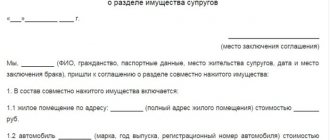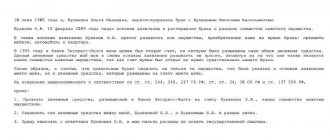Legislative regulation
Questions about the division of property of spouses relate simultaneously to both civil and family legal relations. Accordingly, they are regulated by the Family and Civil Codes of the Russian Federation.
In addition, since the division of property, as a rule, is carried out in court, when going to court and during the trial, one should be guided by the Civil Procedure Code of the Russian Federation. You should also pay attention to the resolution of the Plenum of the Supreme Court of the Russian Federation dated November 5, 1998 No. 15 “On the application of legislation by courts when considering cases of divorce,” which is important when considering the category of cases related to the division of property of spouses and the statute of limitations on such matters.
The Supreme Court clarified how to calculate the statute of limitations when dividing real estate of former spouses
How much time after a divorce does the ex-spouse have to claim his rights to the division of the once common property? The question, unfortunately, is far from idle. Divorce, alas, is a common occurrence. In most cases, they result in litigation related to the division of joint property. Often in this case difficult-to-resolve conflicts arise.
Therefore, it seems very important for many to interpret the law of the Judicial Collegium for Civil Cases of the Supreme Court of the Russian Federation, made when reviewing the results of the legal dispute between former spouses. We were talking about the timing of the division of property.
There is a well-known rule that many have heard of; according to the law, the statute of limitations for any civil disputes is three years. I missed it and lost the right to demand anything.
But at what point does the countdown of these three years begin? The clarification of this nuance by the Supreme Court will certainly be useful to many citizens who have claimed or wish to claim their rights.
The limitation period should be counted from the day when one of the spouses learned about the violation of his right
Our story began in the Krasnodar region. There, a citizen demanded from his ex-wife the division of jointly acquired property. And this happened four years after the divorce.
Local courts of first and appellate instances unanimously rejected the citizen’s claims, pointing out in their decisions that the plaintiff was “late”—he missed the statute of limitations.
But the Supreme Court explained to its colleagues that they had calculated the statute of limitations incorrectly.
The essence of the legal dispute was as follows. The couple divorced without dividing everything they had acquired over the years of marriage. In legal terms, from the very beginning they did not make demands for the division of common property. So four years passed. And then the ex-husband came to the Prikubansky District Court. Judging by the lawsuit, the citizen wanted to receive 2.4 million rubles in compensation from his ex-wife for half of their former apartment.
The district court, having heard these demands, rejected the citizen’s claim. The plaintiff challenged the refusal in the Krasnodar Regional Court. But also without success. The appeal only confirmed the decision of the first instance. Both the district and regional courts declared in unison that the plaintiff remembered his property too late, all the statute of limitations had passed. In general, we should have thought earlier.
Then the ex-husband went further and further to complain, turning to the Supreme Court. There, the Judicial Collegium for Civil Cases requested the case materials, studied them and said that, in fact, the plaintiff was right. And it’s not he who has the problem with calculations, but the local courts.
The panel for civil cases began its explanations by recalling its own decision of the Plenum of the Supreme Court (SC No. 15 of November 5, 1998). It was called: “On the application of legislation by courts when considering divorce cases.”
This resolution literally says the following: the three-year limitation period for the division of property should be counted not from the time of termination of the marriage, but from the day when one of the spouses “learned or should have known” about the violation of his right.
When our hero filed a lawsuit, he said that for a long time he did not go to court with a demand for division of property, because this was not necessary. But then, years later, he completely unexpectedly learned that his right had been violated.
And this violation was expressed in the following way - the citizen wanted to dispose of his share in the shared apartment, but it turned out that the entire apartment was pledged to a large bank.
It turned out that the owner did not have any relationship with this bank, and despite this, the bank took part of someone else's property as collateral.
The Supreme Court drew attention to the fact that the Prikubansky District Court, having refused the person, did not even inquire when exactly the rights of the plaintiff in the case were violated. Following the district court, the Krasnodar Regional Court read the plaintiff’s arguments about the violated right, but called them “unfounded” without explaining the reasons. As a result, the Judicial Collegium for Civil Cases of the Supreme Court called the conclusion of the courts that the plaintiff had missed the statute of limitations premature.
Judicial practice shows that disputes about the statute of limitations when dividing jointly acquired property are common. And the Supreme Court only recalled the established judicial practice.
Although he agreed that he often encounters a common misconception not only among citizens, but also among colleagues. It goes like this: if you wait three years from the date of divorce, then all the property will go to the person in whose name it is registered.
In our case, the local courts ignored important circumstances that are essential for the correct resolution of the case. Namely, that throughout the years that have passed since the date of divorce, “the use of the disputed property was carried out by mutual consent of the former spouses, the plaintiff did not renounce his right to the share.”
Local courts ignored the fact that the spouses used the property by mutual consent
Determining the moment of violation of a citizen’s rights is the most important component in establishing the beginning of the limitation period. It depends on the specific situation, as well as on the evidence available in the case. Usually, the courts start from the date when the plaintiff wanted, but was unable to exercise his right to jointly acquired property, and until that moment it is considered that the parties did not have a dispute about the procedure for using the common property.
Such long and expensive legal proceedings can be avoided if you simply sign a prenuptial agreement. Such an agreement can be concluded at any stage of marriage. It is possible for spouses to agree in advance and immediately stipulate, even before Mendelssohn’s march, what will get to whom if the family boat crashes into everyday life.
But the option is not excluded when the marriage contract is signed by “adult” spouses, after dozens of years of marriage and with grown children.
Text: Natalya Kozlova
Rossiyskaya Gazeta - Federal Issue No. 164 (8218)
Division of property upon divorce
According to the general provisions of civil law, property acquired by spouses during marriage is considered their common property. It is not for nothing that it is called jointly acquired property, because it is believed that each of the spouses contributes to its acquisition, which means that when dividing such property, each of the couple has the right to count on their part.
The law assumes that both spouses have the right to claim equal shares in the common property. However, in reality, everything is often not so simple, and in court the shares are determined far from equally.
What is the limitation period
The possibility of filing a claim in court for the division of property acquired during marriage is limited to a certain time frame. In civil law, this period of time is called the limitation period.
In accordance with the provisions of Art. 195 of the Civil Code of the Russian Federation, the limitation period is understood as the period during which a person whose rights have been violated has the right to protect his rights and interests in the judicial system.
The RF IC determines that the limitation period for division of property is three years.
Limitation period in family law when drawing up a marriage contract
A prenuptial agreement is one of the main forms of regulating property relations that are established between the subjects of a marriage.
Challenging its conditions is provided for in Art. 44 of the IC, on the basis of which it can be declared invalid either in whole or in part. The most important circumstance for recognizing its invalidity is the placement of a party to the agreement in a too unfavorable position or the establishment of conditions in it that are clearly contrary to legal norms.
The fact that the agreement in question is a transaction gives grounds for applying to legal relations the statute of limitations in family law of three years, which is established by paragraph 3 of Art. 166 of the Civil Code of the Russian Federation. This is one of the opinions, in particular, with which the Supreme Court of the Russian Federation currently agrees. There is an opinion that the statute of limitations does not apply here.
The party that intends to appeal the consequences of the execution of the agreement must present its demands within one year, as defined in paragraph 1 of Art. 179 of the Civil Code of the Russian Federation.
Author of the article
From what point does the limitation period count?
If they want to go to court, many citizens have a question about how long the law allows this to be done. After all, it is important to know not only the extent of the limitation period, but also to understand exactly how this time is calculated.
The limitation period for the division of property after a divorce is calculated from the moment when the person learned (or should have learned) about the violation of his rights and interests.
As the Supreme Court of the Russian Federation explained in Plenum Resolution No. 15 of 05.11.1998, when dividing joint property of spouses, the three-year limitation period begins not from the moment of divorce (the date of registration of the divorce in the registry office or the entry into force of the court decision), but only from the date when a person knew or could find out about a violation of his right.
Simply put, only when one of the spouses has learned of a violation of their rights, namely from the next day, the statute of limitations for going to court begins to count.
When to file a claim for division of property?
Current legislation allows the division of property of spouses at any time at their request.
Property can be divided:
- during marital relations;
- at the time of divorce, filing a claim for division of property during divorce;
- after divorce.
In this case, the claim must be filed within 3 years of the limitation period. Not a single law contains a clear requirement about when to file a claim - the spouses themselves have the right to decide how to dispose of the right granted by law within a three-year period.
Is it possible to file for division of property after 3 years?
It often happens that for some reason it was not possible to go to court on time. The statute of limitations has been violated. What to do in such a situation, is it possible to file a claim after the expiration of the three-year period?
Yes, such a possibility exists, but this requires certain reasons.
For example, if you missed the statute of limitations for dividing an apartment after a divorce, then if there are grounds defined by law, which we will consider later, it can be restored.
Is it possible to suspend the statute of limitations for the division of property after a divorce?
In accordance with the provisions of Article 202 of the Civil Code of the Russian Federation, the statute of limitations may be suspended. To do this, it is necessary to comply with several conditions established by this article, namely:
- the presence of force majeure circumstances (force majeure);
- government-declared delay (moratorium);
- military service (during martial law)
- suspension of the law regulating specific legal relations.
The reasons for suspending the limitation period, which are provided for in the Civil Code of the Russian Federation, must occur within six months before the filing of the claim in court.
You should also know that when trying to resolve a dispute out of court, for example, through a mediation procedure, the statute of limitations is suspended for the time during which the law requires the pre-trial settlement procedure to last. If such a time is not established, then a period of 6 months applies.
Is it possible to restore the statute of limitations for the division of property after a divorce?
In accordance with Article 205 of the Civil Code of the Russian Federation, if there are reasons that the court considers valid, and only on an exceptional basis, the limitation period can be restored. This means that even after 3 years you can go to court.
Valid reasons are considered:
- stay outside the country;
- being on treatment;
- completion of military service;
- stay in places of deprivation of liberty;
- other.
In each specific case, only the court can recognize this or that reason as valid, so it is worth worrying about collecting the necessary evidence of the presence of circumstances that prevent a timely appeal to the court, as well as proving their valid nature.
conclusions
The division of jointly acquired property of former spouses is a process that not only takes a lot of time and effort, but also requires a certain legal knowledge, as well as attention to meeting deadlines.
Of course, it is better to do everything on time, so if your family relationships are not working out, and your marriage has cracked, then you should not delay resolving controversial property issues. If the problem cannot be resolved peacefully, then you will have to file a lawsuit in court. In this regard, many citizens are concerned about how many years after a divorce property can be divided, as well as what to do if this period has already been missed.
If the statute of limitations has already passed, then do not despair, because the law provides opportunities for their restoration. Of course, you will have to work hard to convince the judge that your reasons for missing the deadline are indeed valid.
Arbitrage practice
In order for the judge’s decisions to be made in favor of the plaintiff, it is advisable to obtain the support of a lawyer, at least receiving advice to understand whether he has a chance when filing a claim for division of property, for example, 5 years after the divorce.
An example of a positive decision for a plaintiff
Ms. Karpova filed a claim with the Bobrovsky District Court of the Voronezh Region for the division of a three-room apartment, which was acquired in marriage with Mr. Karpov. During the hearing, it was established that Ms. Karpova, together with her husband, purchased an apartment during marriage and registered it in her husband’s name. After the divorce, the husband moved to another city. Didn't pay child support. After 4.5 years, the ex-husband returned and demanded that he give up 2 rooms in the apartment for living.
The court decided to divide the apartment in equal shares between the spouses and to assign alimony payments for children in the amount of 25% of the defendant’s income.
Example of refusal due to expiration of time for filing a claim
Citizen Fedchun filed a claim with the Sergiev Posad City Court for the division of a house located in the Khotkovo settlement.
The claim stated that the plaintiff purchased a house with her husband during her marriage. After the divorce, the plaintiff created a new family and moved to live with her new husband, but at the same time remained to live in Khotkovo. After 3.5 years after the divorce, the plaintiff decided to buy an apartment, so she applied for the division of joint property acquired with her first spouse. The consideration of Ms. Fedchun’s case was denied because the court did not find any violation of the plaintiff’s rights, because she knew that only her ex-husband used the house, ran the household, carried out its repairs, and had not previously interfered with the division. If there is a need to divide property after a divorce, then it is advisable for the spouses not to delay resolving this issue. The sooner the process takes place, the greater the chances of a painless resolution of the situation.






